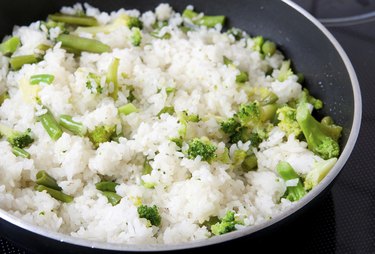
Uncle Ben's Ready Rice is a type of instant rice that just needs to be microwaved for a couple of minutes and ta-da! It's certainly quick and convenient, but is instant rice a good source of nutrition?
Tip
The nutritional value of Uncle Ben's Ready Rice varies depending on the type of rice. Some varieties, like whole-grain brown rice, are healthier than others, like cheddar and broccoli rice for example.
Video of the Day
Video of the Day
About Uncle Ben's Ready Rice
Uncle Ben's is a brand that dates back more than 70 years. It is owned by Mars, the same parent company that owns several chocolate, candy, chewing gum and pet care brands. Uncle Ben's is the billion dollar brand in the Mars stable.
When it launched in the 1940s, its parboiled rice — short for partially boiled rice — was a useful ration in World War II. According to Uncle Ben's, the parboiling process drives the nutrition back into the rice kernel, helping it recapture over 80 percent of the vitamins and minerals of the whole grain.
The University of Arkansas (U of A) confirms that parboiling rice helps it retain the majority of its nutrition. The U of A describes the parboiling process as soaking whole grains of rice, steaming them under pressure, drying them and then milling and polishing them.
While Uncle Ben's original product was long-grain white rice, it has now expanded to different varieties and flavors, including healthier options like whole-grain brown rice. The Uncle Ben's Ready Rice packets that can be microwaved were launched in 2004. Uncle Ben's also offers rice packets that can be prepared in a skillet or boiled in the bag itself.
Read more: How Is White Rice Healthy for Our Body?
Instant Rice Nutrition
The different types of instant rice vary in nutrition depending on the type of rice and the ingredients added to it, and the same is true of Uncle Ben's Ready Rice. The whole-grain brown rice variety for example, can be a healthy addition to your diet if you don't have time to cook rice yourself. It contains nutrients like iron, potassium and B vitamins and doesn't contain any cholesterol, saturated fat or trans fat. Its sodium content is minimal.
Other varieties, like the fried rice or the cheddar and broccoli rice for example, have a higher fat and calorie content and a very high sodium content. A 1-cup serving of the fried rice variety contains 450 milligrams of sodium whereas 1 cup of the cheddar and broccoli rice contains 700 milligrams of sodium.
Each packet contains about two servings, so if you eat the whole packet, you would be eating almost double the sodium. According to the American Heart Association (AHA), your sodium consumption should not exceed 2,300 milligrams per day, although limiting your intake to 1,500 milligrams per day is ideal.
In fact, the AHA notes that processed foods are the biggest culprits when it comes to excess sodium and recommends that you eat less of them. High-sodium diets are associated with high blood pressure and heart problems. If you're buying Uncle Ben's Ready Rice, make it a point to read the label and avoid varieties that contain cholesterol, saturated fat or excess sodium.
According to the USDA, grains should make up around one-fifth of your diet and at least half the grains you eat every day should be whole grains. So opt for a whole-grain variety of rice like brown rice and pair it with lots of veggies, some lean protein and maybe even a side of yogurt for a balanced meal.
Read more: 7-Day Brown Rice Diet
Instant Rice: An Expensive Option
While instant rice is convenient, convenience comes at a price. The Michigan State University (MSU) notes that convenience foods like prepackaged produce, frozen dinners and instant rice tend to be more expensive than cooking from scratch.
If you're trying to eat healthy on a budget, you may be better off cooking your own rice. MSU recommends doubling or tripling your quantities and storing the excess in the fridge so that you save yourself the time and hassle of cooking rice multiple times. According to MSU, cooked rice can be stored in the fridge for up to a week in an airtight container, and for up to a year in the freezer.
Cooking your own rice also means you know exactly how much oil and salt are in it, if any. If you're making your own rice, MSU recommends that you don't rinse it before or after cooking it since that washes away the nutrients in the rice. Cooking it in excess water and draining away the excess liquid is not recommended either, for the same reason.
- Mars: “Mars”
- Uncle Ben’s: “About Uncle Ben’s Rice History”
- Uncle Ben’s: “Uncle Ben’s Rice Products”
- University of Arkansas: “Choosing the Best Rice for Your Cooking Needs”
- Uncle Ben’s: “Uncle Ben’s Ready Rice: Whole Grain Brown Rice”
- Harvard Medical School: “Healthy Meals: 3 Easy Steps to Success”
- Uncle Ben’s: “Uncle Ben’s Ready Rice: Fried Rice”
- Uncle Ben’s: “Uncle Ben’s Ready Rice: Cheddar & Broccoli Rice”
- USDA: “2015-2020 Dietary Guidelines for Americans”
- Michigan State University: “Tips to Eat Healthy on a Budget”
- American Heart Association: “How Much Sodium Should I Eat Per Day?”
- Michigan State University: “Using and Storing Rice”